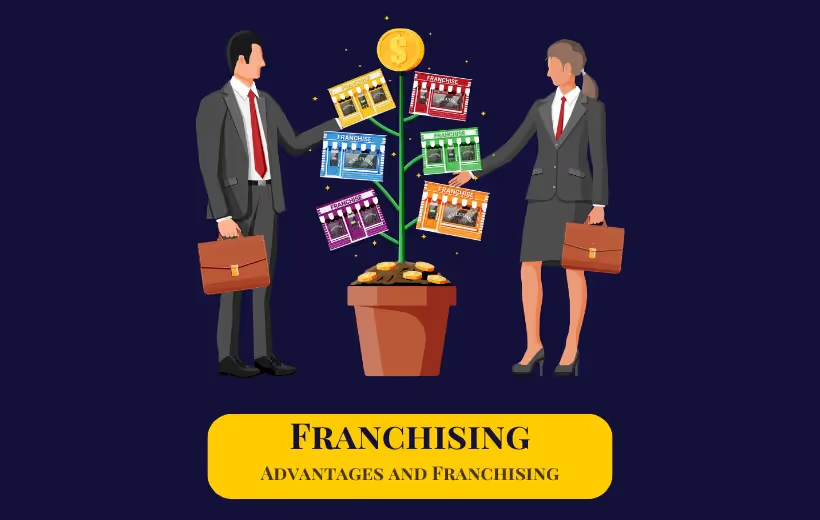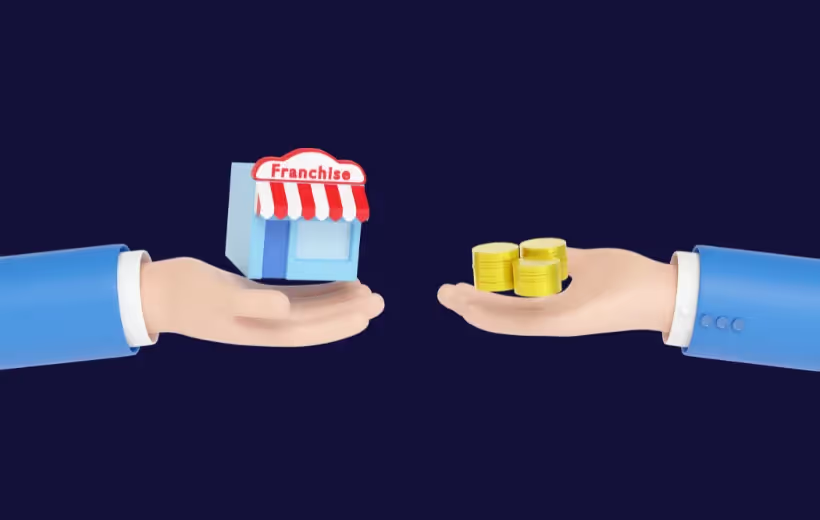Franchise Opportunities By Industry
Franchise Opportunities By Location
Franchise 101
By Investment Level
Franchise Consultant
White Paper
Playbook


The professionals at Franchise Clues weigh the top pros and cons of franchising in today’s article.
When it comes to the advantages and disadvantages of franchising, you should weigh both carefully to ensure you're doing right by your business.
With the Bureau of Labor Statistics reporting that approximately 20% of independent businesses close after two years, while franchise consulting firm FranNet reports that 92% of franchisees were still going strong after two years, franchising is a fantastic model for most. But is it the best option for you?
In this article, we'll cover all you need to know in order to make that call.
Franchising presents an exciting opportunity for aspiring entrepreneurs to start their own business with the backing of an established brand. This business model offers a unique blend of independence and support, making it an attractive option for many.
Below, we explore the key advantages that franchisees can enjoy when they choose to embark on this entrepreneurial journey.
One of the most significant benefits of becoming a franchisee is the extensive business assistance provided. Franchisors offer a structured, proven business model along with training programs, operational support, and guidance. This assistance is invaluable for new entrepreneurs who benefit from a roadmap to navigate the complexities of business operations.
Franchising allows individuals to operate under a recognized brand. This instant brand recognition can be a huge advantage, as customers are more likely to frequent a business they know and trust. This recognition extends to marketing and advertising, where being part of a well-known brand can greatly enhance visibility and customer appeal.
Statistics suggest that franchise businesses have a lower failure rate compared to independent startups. The established systems, expertise, and support provided by the franchisor contribute to this stability, offering a safer investment for new business owners.
Franchisors negotiate lower prices for goods and services on behalf of their franchise network, resulting in cost savings for franchisees. This collective bargaining power means franchisees can access higher-quality products and services at a lower cost, enabling them to compete more effectively in the market and improve their profit margins.
Despite the costs associated with franchise fees and royalties, franchisees often benefit from higher profitability. The combination of a proven business model, brand recognition, and operational efficiencies generally leads to a more favorable financial outcome compared to starting an independent business.
The franchise model offers a tested and refined business strategy, significantly reducing the risk for franchisees. This risk reduction is a key consideration for entrepreneurs who want the excitement and rewards of owning a business without the high risk associated with starting an enterprise from the ground up.
A reputable franchise brings a loyal customer base, which can be a critical factor in a business's success. Franchisees can capitalize on this existing customer loyalty, which helps in achieving faster sales growth and stability in the business.
Franchisees enjoy the independence of making their own business decisions within the framework provided by the franchisor. This includes flexibility in day-to-day operations, staff management, and local marketing initiatives. This autonomy allows franchisees to experience the rewards and challenges of business ownership, with the added benefit of a supportive network.
While franchising offers numerous benefits, it's crucial for potential franchisees to be aware of the challenges and drawbacks that come with this business model. Understanding these disadvantages is key to making an informed decision about entering into a franchise agreement. Below, we explore some of the main challenges faced by franchisees in this business arrangement.
One of the main drawbacks of franchising is the lack of operational freedom. Franchisees are required to adhere to the franchisor's strict guidelines and procedures, which can limit creativity and innovation. These regulations often extend to product offerings, marketing strategies, and store layouts, leaving little room for personalization or local adaptation.
Starting a franchise can involve significant initial investment. This includes franchise fees, which are required to use the franchisor's brand, systems, and resources. Additionally, there are costs associated with setting up the business, such as leasing a location, purchasing equipment, and hiring staff, which can be substantial depending on the franchise.
Beyond the initial costs, franchisees must contend with ongoing expenses. These include royalty payments, which are typically a percentage of the franchisee's sales, and contribute to the franchisor's ongoing support and system improvements. There may also be mandatory contributions to a collective marketing fund and regular costs for supplies and inventory, which must be purchased from approved suppliers.
Franchise relationships can sometimes be fraught with conflict, particularly if the franchisee and franchisor have differing visions or if the franchisor enforces policies that the franchisee finds unfavorable. Disagreements can arise over territory rights, operational changes, or financial arrangements, leading to strained relations and even legal disputes.
As a franchisee, there is often a requirement to share detailed financial information with the franchisor. This includes sales figures, profit margins, and other financial data. For some business owners, this lack of financial privacy can be uncomfortable, as it exposes their business's inner workings to an external entity.

Franchising serves as a powerful tool for business expansion, offering unique benefits to franchisors. It's a strategy that combines growth with risk management, leveraging the strengths and resources of franchisees. In this section, we delve into the key advantages that franchisors gain from adopting the franchising model, which contribute to the overall success and scalability of their brand.
Franchising provides franchisors with an effective way to expand their business without the substantial capital investment typically required for growth. Since franchisees finance their own units, the franchisor can grow the brand's footprint without incurring the heavy costs associated with opening new locations. This access to capital through franchising allows for more rapid expansion than would be possible through direct investment.
Franchising enables a brand to grow efficiently and rapidly. Franchisees, as motivated and financially invested business owners, are likely to be very committed to the business's success. This drive can lead to more efficient operation of each franchise unit, contributing to the overall growth and profitability of the brand.
With franchising, the day-to-day supervision of staff falls to the franchisee, reducing the management burden on the franchisor. This means the franchisor can focus more on big-picture strategies and overall brand management, rather than the nuances of daily operations at each location.
Expanding through franchising can significantly enhance brand recognition. Each new franchise location increases the brand's market presence, making it more visible and accessible to a wider customer base. This can create a virtuous cycle, where increased brand awareness fuels further growth.
Franchising minimizes risk for the franchisor. Since franchisees are responsible for the operation and financial risks of their locations, the franchisor's exposure is limited. This risk distribution is a significant advantage, especially in volatile markets or when experimenting with new market territories.
While franchising offers significant advantages for expansion and growth, it's important for franchisors to be aware of the potential downsides of this business model. Understanding these disadvantages is crucial for effective management and maintaining the integrity of the brand. Below, we discuss some of the key challenges franchisors might face when opting for a franchising strategy.
Franchising means relinquishing a degree of control over how individual units operate. While franchisors set the standards and guidelines, ensuring that every franchisee adheres to these can be challenging. Inconsistencies in customer experience across different locations can impact the overall brand perception.
The franchisor-franchisee relationship can sometimes lead to legal disputes. Disagreements may arise over franchise agreements, operational practices, or territorial rights. These disputes not only consume time and resources but can also damage the brand's reputation if they become public.
Setting up a franchising system requires significant upfront investment from the franchisor. This includes developing a detailed business model, legal documentation, training programs, and marketing strategies. This initial outlay can be substantial and must be managed carefully to ensure a return on investment.
Franchisors must navigate a complex web of federal and state regulations governing franchising. Compliance with these regulations, which include disclosure requirements and operational guidelines, can be costly and time-consuming. Failure to comply can result in legal penalties and harm the brand's credibility.
Are you evaluating a franchise opportunity? Then consider the following components:
Multi-unit franchises, on the other hand, are when you own and operate multiple franchise locations. This can be a good option for you if you have experience in the industry and want to expand your business quickly. Lastly, market franchises are when a company grants the rights to a franchisee to operate in a specific geographic area, which is helpful for focusing on specific markets.
Before you make a decision, you should do thorough research on the franchise you're considering. This includes researching the franchisor, the franchise system, and the industry.
You should look into the franchisor's history, the franchise's success rate, the franchise's current support system, and the industry's growth potential.
You'll also want to meet with current franchisees to get an accurate picture of the franchise. They can tell you about their experiences and give you insight into any issues or problems they may have encountered.
To do this, we recommend breaking it down into six simple research steps:
Need help getting started? Our Franchise Opportunities breaks down franchising opportunities by industry to ensure that you find the perfect fit for your skillset, interests, and goals.
Weighing the pros and cons of owning a franchise is no easy task. That’s why we recommend seeking out professional support and consultation wherever you can.
Franchise consultations, for example, are 100% free–and their job is to learn what your ideal business looks like.
From there, they’ll investigate available franchise opportunities and help you refine your list to the most desirable choices. Typically, franchise consultants receive a commission from the franchisor you choose, so their services are free to you.
As far as consultants go, you’d be hard-pressed to find a more knowledgeable and enthusiastic team than our crew here at Franchise Clues. e work to maximize both growth and returns for all of our teams and franchisees. The seven brands in our portfolio have locations all around the globe and are leaders in their respective industries, each with impressive financial performance.
Our mission is to transform the traditional franchise development value proposition that owning a franchised business is a safer path to entrepreneurship. Instead, our professionals value franchising – not only as a chance to develop an income stream separate from the traditional employer-employee relationship but more as an opportunity to develop skills through repeated interaction with peers and franchise coaching support.
At its most effective, franchising harnesses the power of networks and fosters human development through entrepreneurship… and we believe that there’s a franchising model out there for everyone.
Franchising offers distinct opportunities and challenges for franchisees and franchisors alike. While franchisees gain the support of an established brand and a proven business model, they must adhere to strict guidelines and manage financial commitments. Franchisors benefit from efficient expansion and reduced risks but must contend with brand consistency and regulatory compliance. Successful franchising requires careful consideration and a clear understanding of these dynamics. Ultimately, it's a partnership that, when navigated wisely, can lead to mutual growth and success in the business world.